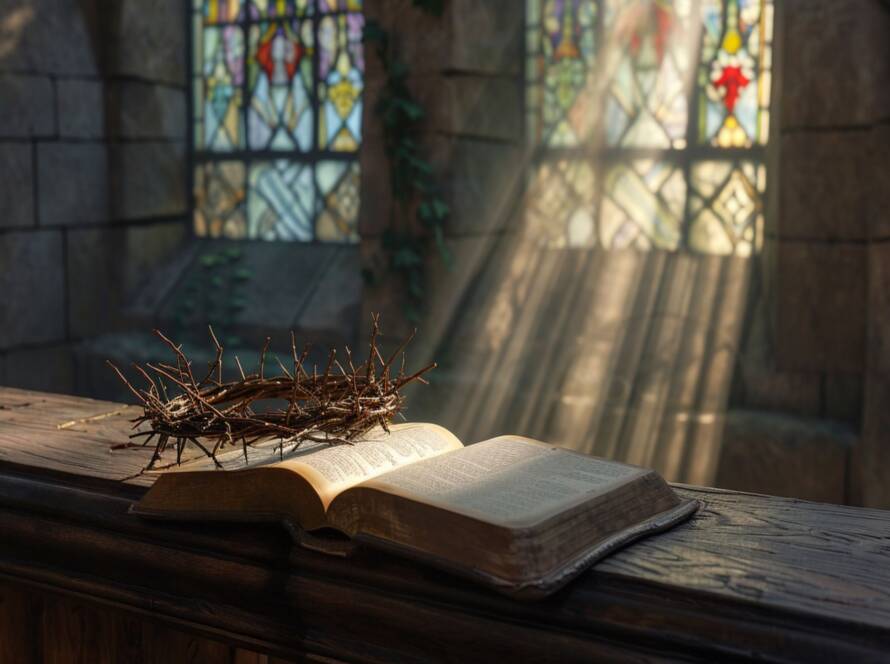We don’t study doctrine and theology just to fill our minds with knowledge or to become overly academic. The purpose of understanding the truth of God’s Word is to shape how we think and live as Christians—the covenantal people of God. The doctrine of the covenant of works is a vital truth that has often been neglected. Without understanding it, our view of what Jesus Christ came to accomplish becomes incomplete, and our understanding of our responsibilities as Christians in the world is diminished.
Our God is a covenant-keeping God who never breaks His Covenant promises. In the beginning, the entire human race was sinless and in a covenant relationship with Him. This covenant is known by different names, such as the Covenant of Works, the Covenant of Life (as stated in the Westminster Confession of Faith), and the Covenant of Creation, as described in a well-regarded book (The Christ of the Covenants) by Palmer Robertson.
Some who oppose covenant theology argue that the first three chapters of Genesis do not mention the word “covenant,” and therefore, they claim there is no such thing as the Covenant of Works. They may suggest that this concept is imposed on the Bible rather than found within it. However, let me clarify: just because a word, like “Trinity,” does not appear in Scripture does not mean the concept is absent. The doctrine of one God in three persons is clearly supported by Scripture, and believing in it does not mean we are imposing ideas on the Bible. Similarly, the absence of the word “covenant” does not negate the presence of the concept.
In Hosea 6:7, the Lord says, “But like Adam, they [Israel and Judah] transgressed the covenant; there they dealt faithlessly with me.” This clearly shows that Adam was in a covenant relationship with God in Eden and broke that covenant through disobedience. This verse highlights two key points in Covenant Reformed theology: first, Adam was created in a covenant with God, and second, Adam’s disobedience brought devastating consequences—not only for himself but for all humanity, whom he represents and from whom we all descend.
Dr. Palmer Robertson defines a covenant as “a bond in blood sovereignly administered.” This means it is a binding relationship between God and humans, involving life and death. For example, God told Adam that if he ate from the tree of the knowledge of good and evil, he would surely die, but if he obeyed and refrained, he would live.
The Bible contains many references that support the covenant of works. For example, in Jeremiah 33:19-21, God says that if He could break His covenant with the day and night so that they no longer follow their appointed times (as ordained at creation—day following night, the first day, second day, and so on), then His covenant with David could also be broken. This emphasizes that just as the natural order cannot be broken, neither can God’s covenant promises to David. This is a messianic promise pointing to Christ and His eternal kingdom.
Similarly, in Jeremiah 31:35 , God reaffirms His covenant by stating that the fixed order of the sun and moon as lights by day and night will not be altered. In the same way, His promises concerning His people will remain unbroken.
Furthermore, Romans 5:12 draws a parallel between Adam and Christ. Just as Christ is in a covenantal relationship with His spiritual people, Adam had a covenantal relationship with his physical descendants. Adam, as the head of the covenant of works, represented humanity, while Christ, as the head of the covenant of grace, represents His redeemed people. This parallel only makes sense if both Adam and Christ are
heads of covenants—Adam of the covenant of works and Christ of the covenant of grace.
The elements of the covenant of the Works:
The covenant of works emphasizes the condition God set for Adam: if Adam worked properly and produced perfect good works during the probation period, he would be granted life to the highest degree. However, even one act of disobedience would result in death. This is why it is called the covenant of works. The focus was on Adam’s obedience and perfect works.
Though called the covenant of works, it was ultimately based on God’s grace. Adam and Eve had not yet sinned and were in a sinless, perfect relationship with God. They had done nothing to deserve His displeasure, but even so, Adam, as God’s creature, owed Him 100% obedience. Whether or not God gave a reward, Adam was duty-bound to obey simply because God is the Creator. When Adam did his best, he was merely fulfilling his obligation as a created being.
God was under no obligation to reward Adam for simply doing his duty. Yet, God graciously promised Adam life in its fullest measure as a reward for his obedience. This shows that the covenant of works, though based on obedience, was deeply rooted in the sheer goodness and grace of God.
In the covenant of works, there were two key parties: first, the Sovereign God, and second, Adam, who served as the representative of the entire human race. This means that every human being who would ever live was represented by Adam in this covenant. Similar to how we might have representatives in government or leadership, Adam acted on behalf of all humanity.
This relationship was not something Adam chose or devised; it was established by God. God sovereignly operates through representatives, meaning that whatever Adam did in the covenant, he did on our behalf. The consequences of Adam’s actions, whether good or bad, were applied to all humanity. If Adam had obeyed God perfectly, he would have secured eternal life in its fullest measure for himself and for all those he represented. However, Adam disobeyed God, and because he acted as our representative, it is as though we also disobeyed God.
The consequences of Adam’s sin—guilt, corruption, and condemnation—are now passed down to every human being. Even if we had never committed any personal sin (though we do), we would still be condemned because of Adam’s disobedience.
Romans 5:12 confirms this truth: “Sin entered the world through one man, and death through sin, and in this way death came to all people, because all sinned.”
Since Adam was our representative, we are held accountable for his sin. Additionally, his sinful nature is passed down to us, resulting in our own sinful tendencies. Thus, we stand condemned not only for our own sins but also for Adam’s sin, which he committed on our behalf as our representative.
The idea of being represented by Adam in the covenant of works may not be well pleased with modern individualistic thinking. Many might say, “I don’t want anyone representing me like that—I want to stand or fall on my own actions.” But let’s examine what that mindset really is. First, it’s rooted in pride and arrogance of the highest order. It assumes that ‘I’, in my current sinful and flawed state, could have done a better job of obeying God than Adam, who was created perfect and lived in a perfect environment in the Garden of Eden. Such a mindset essentially claims, ‘God’, You didn’t handle things properly. If I had been in Adam’s place, I would have done better.”
This attitude reveals a complete lack of humility and an unrealistic view of our own weaknesses. It ignores the reality of human sinfulness and the struggles we face daily. The truth is, Adam—who was sinless and lived in a perfect world—was far better equipped to represent humanity than we could ever be. To claim otherwise is to misunderstand both the situation in the Garden and the condition of our own hearts.
There is another problem with this way of thinking. Those who don’t want Adam to represent us, who complain about him acting on our behalf, never seem to complain about another representation—the one at Golgotha, where Jesus Christ is our representative. No one objects to Jesus representing us at the cross. He died in our place, taking the punishment we deserve. He bore the consequences of our sin upon Himself. While some may not like the idea of Adam representing us in the Garden of Eden, they never argue about Jesus, who perfectly represented us at Calvary. Jesus’ sacrifice is a much greater representation, and yet it’s embraced because through it, we receive salvation.
God’s covenant of works has never changed, and it is just as true today as it was 6,000 years ago when it was first given to Adam. God still requires perfect obedience from mankind to have a relationship with Him. To receive life in its fullest sense, we must give God 100% obedience to His law. But the problem is, we cannot do this. We are unable to live up to God’s perfect standards, so instead of blessing, we are under a curse. We are condemned.
This is where we need a Mediator, someone to represent us and fulfill the demands of the covenant of works. The covenant of works says that only perfect obedience can lead to salvation and life. If the law is broken, the consequence is death. Without meeting these demands, we cannot escape the punishment of hell.
But Jesus Christ came to earth and lived a perfect life for thirty-three years as our representative. He obeyed God fully, fulfilling the covenant of works on our behalf. Then, on the cross, He took the punishment we deserved, removing the curse and condemnation we inherited from Adam. The covenant of grace, which gives us salvation, is based on Christ’s fulfillment of the covenant of works. We are saved by obedience, but not our own. It is through Christ’s obedience that all those He came to redeem are saved.



